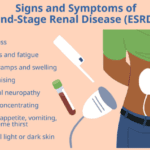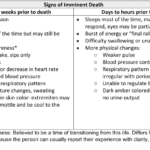Tag: Good Death
Articles about how to help a terminally ill patient have a good death naturally.
Articles about how to help a terminally ill patient have a good death naturally.

If your loved one has been diagnosed with End Stage Renal Failure, it's natural to feel overwhelmed and unsure about what to expect during the disease. As an experienced hospice nurse with years of experience, I am here to guide you through this journey with compassion and empathy. In this article, we will cover what end-stage renal Failure is, the changes you may observe in your loved one, and how to provide the best care from onset until the end of life.

Recognizing end-of-life signs can be challenging. This guide outlines key symptoms indicating a terminally ill patient may have less than two weeks, offering crucial insights for caregivers and families.

As an experienced hospice nurse with years of experience, I understand that coping with a loved one's diagnosis of Chronic Obstructive Pulmonary Disease (COPD) can be overwhelming and challenging. In this article, we'll explore what to expect over the course of the disease, the changes you might notice in your loved one, and how to provide the best care and support from the onset until the end.

In the realm of hospice care, where empathy and compassion are paramount, a remarkable approach called Validation Therapy has emerged as a beacon of hope and comfort for individuals facing dementia and cognitive disorders in their final journey. As an experienced hospice registered nurse case manager, I've witnessed the transformative impact of Validation Therapy on patients, allowing them to find solace, regain their self-worth, and experience a sense of dignity during their end-of-life phase.

Dying doesn’t always hurt. The amount and type of pain there is at the end of life can differ. The specific diagnosis and cause of pain are factors.

I have worked with countless terminally ill patients and their families. One of the most important aspects of hospice care is ensuring that the patient and their loved ones are prepared for the end of life.
In this article, I will cover the topics that hospice nurses should discuss with patients and caregivers to ensure a good death.

Navigating the final days of a loved one's life can be a challenging and emotional journey. One of the signs that can be observed during this time is known as terminal restlessness. As someone deeply rooted in hospice care, I have witnessed various manifestations of this restlessness. Understanding its types, causes, and management strategies is crucial for providing compassionate end-of-life care. This article aims to illuminate the different kinds of terminal restlessness, identify reversible causes, and discuss effective management techniques. By equipping caregivers, families, and healthcare professionals with this knowledge, we can ensure that terminally ill individuals experience comfort and dignity in their final days.